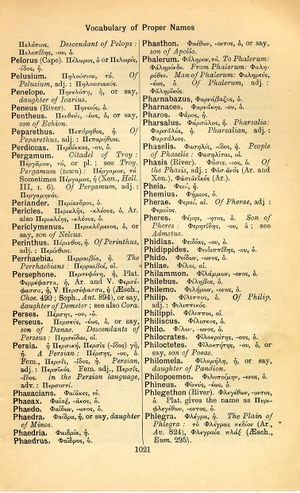Phaedrus: Difference between revisions
οἷς πρόθεσίς ἐστιν ἀδικεῖν, παρ' αὐτοῖς οὐδὲ δικαία ἀπολογία ἰσχύει → not even a just excuse means anything to those bent on injustice | the tyrant will always find a pretext for his tyranny | any excuse will serve a tyrant
(Gf-D_7) |
(3_10) |
||
| Line 8: | Line 8: | ||
{{Gaffiot | {{Gaffiot | ||
|gf=<b>Phædrus</b>,¹⁵ drī, m. (Φαῖδρος),<br /><b>1</b> un des disciples de Socrate dont [[Platon]] prit le nom comme titre d’un dialogue [le Phèdre] : Cic. Tusc. 1, 53<br /><b>2</b> [[philosophe]] épicurien : Cic. Fam. 13, 1, 2<br /><b>3</b> Phèdre [fabuliste]. | |gf=<b>Phædrus</b>,¹⁵ drī, m. (Φαῖδρος),<br /><b>1</b> un des disciples de Socrate dont [[Platon]] prit le nom comme titre d’un dialogue [le Phèdre] : Cic. Tusc. 1, 53<br /><b>2</b> [[philosophe]] épicurien : Cic. Fam. 13, 1, 2<br /><b>3</b> Phèdre [fabuliste]. | ||
}} | |||
{{Georges | |||
|georg=Phaedrus, ī, m. (Φαιδρος), I) [[ein]] epikurëischer [[Philosoph]] zu Athen, [[Lehrer]] Ciceros, Cic. Phil. 5, 13; ep. 13, 1, 2. – II) [[Schüler]] [[des]] Sokrates aus Myrrhinus in Attika, [[nach]] dem [[Plato]] [[ein]] [[Gespräch]] [[Phaedrus]] betitelte, Cic. de or. 1, 28; Tusc. 1, 53. – III) Freigelassener [[des]] [[Augustus]], Thrazier [[von]] [[Geburt]], [[Verfasser]] der bekannten Fabeln in Äsops [[Art]]; vgl. W. Teuffel Gesch. der röm. Liter.<sup>6</sup> § 284. – / Nbf. [[Phaeder]] (no. II), [[Front]]. ep. Graec. 7. p. 254, 14 N; vgl. Reisigs Vorles. herausg. v. Hagen 1, 97. Anm. 51. | |||
}} | }} | ||
Revision as of 09:14, 15 August 2017
English > Greek (Woodhouse)
Φαῖδρος, ὁ.
Latin > English (Lewis & Short)
Phaedrus: (nom. PHAEDER, Inscr. Grut. 1111, 3), i, m., = Φαῖδρος.
I A pupil of Socrates, a native of Myrsinus, in Attica, after whom Plato named one of his dialogues, Cic. de Or. 1, 7, 28; id. Or. 4, 15; 12, 39; id. Fin. 2, 2, 4; id. Tusc. 1, 22, 53 al. —
II An Epicurean philosopher of Athens, an instructor of Cicero, Cic. Fam. 13, 1, 2; id. Fin. 1, 5, 16; id. N. D. 1, 33, 93; id. Phil. 5, 5, 13.—
III A freedman of Augustus, a Thracian by birth, and author of some well-known Latin fables.
Latin > French (Gaffiot 2016)
Phædrus,¹⁵ drī, m. (Φαῖδρος),
1 un des disciples de Socrate dont Platon prit le nom comme titre d’un dialogue [le Phèdre] : Cic. Tusc. 1, 53
2 philosophe épicurien : Cic. Fam. 13, 1, 2
3 Phèdre [fabuliste].
Latin > German (Georges)
Phaedrus, ī, m. (Φαιδρος), I) ein epikurëischer Philosoph zu Athen, Lehrer Ciceros, Cic. Phil. 5, 13; ep. 13, 1, 2. – II) Schüler des Sokrates aus Myrrhinus in Attika, nach dem Plato ein Gespräch Phaedrus betitelte, Cic. de or. 1, 28; Tusc. 1, 53. – III) Freigelassener des Augustus, Thrazier von Geburt, Verfasser der bekannten Fabeln in Äsops Art; vgl. W. Teuffel Gesch. der röm. Liter.6 § 284. – / Nbf. Phaeder (no. II), Front. ep. Graec. 7. p. 254, 14 N; vgl. Reisigs Vorles. herausg. v. Hagen 1, 97. Anm. 51.

